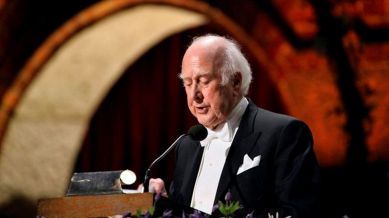Peter Higgs dies at 94: 10 unknown facts about legendary physicist who theorised the Higgs boson
Peter Higgs, the eminent scientist who proposed the "Higgs boson" particle named after him, passed away on Monday.

Peter Higgs, the eminent theoretical physicist who first proposed the idea of what we now know as the “Higgs Boson,” died at the age of 94 on April 8. Higgs won the Nobel Prize in 2013 for his work which found that the particle is responsible for giving all particles mass.
“It has been confirmed that Professor Peter Higgs has died at the age of 94. He passed away peacefully at home on Monday. April 8, following a short illness,” said a statement from the University of Edinburgh on Wednesday.
Here are ten things you may not have known about the scientist.
- 01
The discovery of the Higgs boson was decades in the making
Higgs initially predicted the existence of the Higgs boson in 1964. But it took almost 50 years for it to be confirmed. Scientists used the Large hadron Collider at CERN to confirm his theory in 2012. He jointly won the 2013 Nobel Prize in Physics along with Belgian theoretical physicist Francois Englert.
- 02
His theory did not find acceptance immediately
He had a difficult time getting his theory published in scientific journals in 1964, partly because no one understood it, according to BBC.
- 03
His father worked at the BBC
He was born in Newcastle upon Tyne in the United Kingdom to a Scottish mother and an English father who worked as a sound engineer at the BBC.
- 04
He had asthma as a child
Higgs suffered from asthma as a child, and because of this, he received part of his early education at his home in Bristol. He later moved to London to study maths and physics when he was 17 years old.
- 05
He spent almost all his life at the University of Edinburgh
He moved to the Univeristy of Edinburgh in 1954 after receiving his Ph.D from King’s College. He spent most of his time there with the exception of a few years spent in London in the late 1950s.
- 06
He was a famously modest man
After his proposal of the existence of the particle was confirmed in 2012, he told journalists, "It's very nice to be right sometimes,” according to the BBC.
- 07
He didn’t own a mobile phone
It is a famous joke that scientists often miss the calls telling them they won the Nobel Prize. But the Royal Swedish Academy of Sciences couldn’t call him because he did not own a cellphone.
- 08
He led a low-tech life
If you were surprised by the fact the reclusive genius owned no cell phone in 2013, you might be even more surprised to learn that he didn’t use the internet or watch television at the time, according to ABC.
- 09
He hated the ‘god particle’ name
Higgs was a staunch atheist, and he did not like the fact that people called his particle “god.”
- 10
Englert accepted the Nobel for both of them
Thanks to his low-tech life, his colleague accepted the award on behalf of both as the academy continued to struggle to reach him.